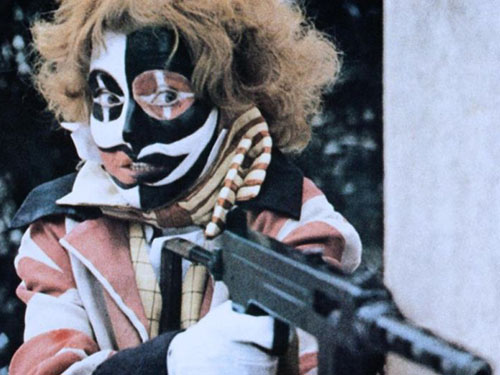
“It seems as if Fassbinder needed to purge his system after In einem Jahr mit 13 Monden (1978), a traumatised remake of Louis Malle’s Le feu follet (1963), chronicling a transsexual depressive’s last days, and inspired by the suicide of Fassbinder’s lover Armin Meier. Meier had appeared in Fassbinder’s segment of Deutschland im Herbst in which the director agonised over the draconian government response to RAF atrocities, while mercilessly bullying his lover, his mother and a homeless man. That liberal hypocrisy is amplified ad absurdio in Die Dritte Generation, as a group of bourgeois professionals – including a record shop owner, a history lecturer, a banker’s wife, a personal secretary and a composer – enjoy the ‘game’ of being in a terrorist cell, with its apparatus of codes, passwords, whispers and disguises, but literally wet themselves when called to action. As a quote from anarchist theorist Mikhail Bakunin implies, these are children who refuse to grow up: they bully those weaker as if they were still in a schoolyard, and ultimately can’t handle ‘real’ life. When Edgar (Udo Kier) witnesses the murder of a co-conspirator by policemen led by his father (Hark Bohm), who is also sleeping with his wife (Hanna Schygulla), he collapses into Oedipal blubbing. As the terrorists go into hiding, they bicker and compete like the kids in any extended family.”
Darragh O’Donoghue1
“The dilemma of our present ‘culture of commemoration’ is that it demonstrates a belief in history (that is why we pick a date from the past) while also betraying immense scepticism towards history (that is why we now read the past transversally or spatially, rather than in linear fashion). It is this paradox that I want to explore around the case of Fassbinder, as a way of understanding his work’s historicity. I want to argue that his films are very precisely of their time, place and moment, and that they constitute a kind of feedback system, open towards the future which is our present as well as doubling back to re-inscribe our present in a history. Such a historicity would be the effect of something appearing in retrospect as prescient and prophetic: a sort of short-circuiting of causality and consequence in the convergence of retroactive recognition. Yet, if with hindsight we can designate something as prophetic, we open a closed loop: we do not discover some sort of necessary causality, although it might seem so. Rather, a moment in the past reveals itself as especially pregnant and prescient for the future, in order to affirm not only that our present has a past but that this past can empower us to face an uncertain future. It is a historicity that strongly confirms the contemporary predicament: the more we are traumatized by the present, the more we ‘remember’ the past. This would be my primary claim to Fassbinder’s relevance and topicality: not that he predicted a specific event or outcome; rather, that he – perhaps better than any other modern filmmaker besides Luis Buñuel – understood the logic of why we have to replay the past, in order to even imagine a future, and why we have to see the present – any present – in terms of history, in order not to be swallowed by the eternal presence of the past, which the very existence of the cinema has brought into the world.”
Thomas Elsaesser2
- 1Darragh O’Donoghue, “The Third Generation,” Senses of Cinema, June 2011.
- 2Thomas Elsaesser, “Retroactive Prescience: Fassbinder’s The Third Generation,” Elsaesser’s website, 2013.